Edie Melson's Blog, page 34
November 7, 2024
Beatitudes of Gratitude for Writers
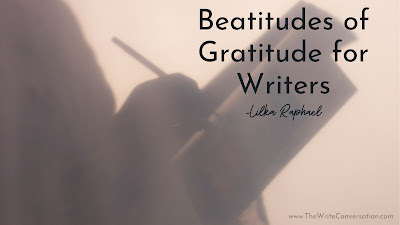
by Lilka Raphael @Lilka_Raphael
‘Thank you’ is the best prayer that anyone could say. I say that one a lot. Thank you expresses extreme gratitude, humility, understanding - Alice Walker
Writing is a profession full of highs and lows. Rewards and accolades can be rare. Yet, we continue to write despite fatigue, disappointment, delays, and revisions.
In this season of gratitude, here are three reasons for writers to be grateful.
Blessed Are Those Who Keep StrivingIn a world of criticism and chatter, it takes audacity to put ourselves out there and release our words. Even accomplished writers can become apprehensive when contemplating a new project or switching genres. Daring to share our work with an editor, agent, and other writers is an accomplishment. We take a risk every time we push forward and present ourselves as writers. Still, we persist. As we grow and our work evolves, our efforts are eventually rewarded.
Blessed Are Those Who Keep LearningThis includes everything from attending a writers conference to learning about new opportunities to highlight our work. Networking with publishing professionals, critique groups, and writers groups count as well. Considering the advice of other writers, attending online classes, and accepting feedback from editors and agents are all ways that we can grow as writers. There are classes and workshops that span everything from grammar basics to social media mass marketing.
Staying engaged within our profession makes us savvy, relevant, and increases our prospects to succeed. We can become so focused on what we want to accomplish that we fail to recognize the progress we have made. Success is relative. We must never allow what we have yet to achieve to overshadow our gains.
Blessed Are Those Privileged to WriteIf you are reading this, odds are high that you live under a government that allows us to share our beliefs, express opinions, and use words to enhance the lives of others. This is a basic freedom that we don’t acknowledge nearly enough. Technology and evolving trends permit us to bypass traditional publishers and offer our words to the masses at will. We can share our political views, religious practices, and personal tragedies. This is not possible worldwide.
Furthermore, the skill to string sentences together into a comprehensible thought is something most writers underestimate. We are gifted with talent, time, and opportunity to share our work. We are privileged to educate, entertain, challenge, and comfort. We are blessed to read and write at will.
When we find ourselves frustrated, giving thanks for the talent we have, skills we have acquired, and the luxury to express ourselves puts everything else into perspective. It is an attitude of gratitude that propels us forward, grants us favor, and allows us to achieve our writing goals.
Be anxious for nothing, but in everything by prayer and supplication, with thanksgiving, let your requests be made known to God; Philippians 4:6 NKJV
TWEETABLEBeatitudes of Gratitude for Writers from @Lika_Raphael on @EdieMelson (Click to Tweet)
 A Florida native, Lilka Finley Raphael has been a licensed pharmacist for over thirty years. Her passions for writing, gardening, and photography prompted her to share her experiences and life lessons on her blogs B Is for Blessed and God, autism, & me. You can learn more about her at lilkaraphael.com
A Florida native, Lilka Finley Raphael has been a licensed pharmacist for over thirty years. Her passions for writing, gardening, and photography prompted her to share her experiences and life lessons on her blogs B Is for Blessed and God, autism, & me. You can learn more about her at lilkaraphael.comLilka’s greatest achievements are her two adult sons who have flown the nest. Happily married for thirty-two years, she lives east of Atlanta with her husband, Rod. They now share their home with two German Shepherds—Holly and Ivy—and one naughty kitty, Moxie.
Published on November 07, 2024 22:00
November 6, 2024
10 Reasons for Writers to Be Grateful
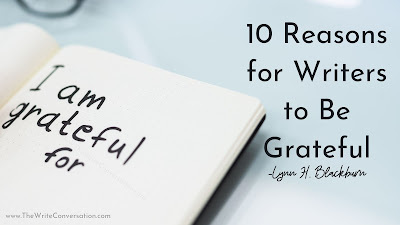
by Lynn H. Blackburn @LynnHBlackburn
Writers are weird. We know this. We embrace this.
So why should we be surprised that a writer’s take on gratitude would be anything…normal?
Today, I present to you some of the things I’m jotting down this month as I focus on gratitude. I like to keep my gratitude journal entries short and sweet, but for you, I’ll elaborate…just a little!
10 Things a Writer Can Be Grateful For
1. The delete key.
Ah, the beloved delete key. The magic eraser of plot holes and purple prose. Where would we be without you?
2. Permission to eavesdrop? Granted.
Is it really rude if it’s research? I don’t think so.
3. Imaginary Friends.
In what other job is it not only acceptable but encouraged to have not just one but many, many imaginary friends?
4. Mischief Managed.
If I went around unaliving people on a regular basis in real life, that would be frowned upon. Okay, that would put me in jail. But I’ve blown people up, run people over, and thrown people off bri…no, wait, I haven’t done that…yet.
5. Wonderful Weirdness.
Y’all, before I started writing, there really wasn’t an excuse for me. But now? When I do something weird, I can just say, “I’m a writer,” and it all makes sense!
6. Notebooks, Journals, and Pens.
Because having a stationery obsession is perfectly acceptable behavior.
7. Introvert Powers Activated
The holidays are coming up. And has there ever been a better excuse for escaping a party (or, you know, maybe a family gathering) with, “So sorry to dash, but I’m on a deadline”? I think not.
8. The Muse.
The muse can be everything from an excuse to a dream client. Can’t get any words written? The muse is silent. Writing non-stop? The muse won’t shut up. Just had the best idea of your life? Okay, that’s all you, baby. Don’t give the muse credit for everything!
9. Search History Shenanigans.
Did she research arsenic for her book or for some other reason? We’ll never know.
10. Coffee. Chocolate. Comfy pajamas.
Because who can create when they are cold, tired, and uncomfortable? Not me. But I don’t have to! I can drink coffee, feed the muse with chocolate, and work from the comfort of my own house. I don’t even have to get dressed! This is something to be truly thankful for.
What would you add to the list?
Grace and peace,Lynn
TWEETABLE10 Reasons for Writers to Be Grateful from @LynnHBlackburn on @EdieMelson (Click to Tweet)
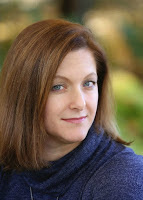 Lynn H. Blackburn is the award-winning author of Unknown Threat, Malicious Intent, and Under Fire, as well as the Dive Team Investigations series. She loves writing swoon-worthy southern suspense because her childhood fantasy was to become a spy, but her grown-up reality is that she's a huge chicken and would have been caught on her first mission. She prefers to live vicariously through her characters by putting them into terrifying situations while she's sitting at home in her pajamas! She lives in Simpsonville, South Carolina, with her true love, Brian, and their three children. Learn more at www.lynnhblackburn.com.
Lynn H. Blackburn is the award-winning author of Unknown Threat, Malicious Intent, and Under Fire, as well as the Dive Team Investigations series. She loves writing swoon-worthy southern suspense because her childhood fantasy was to become a spy, but her grown-up reality is that she's a huge chicken and would have been caught on her first mission. She prefers to live vicariously through her characters by putting them into terrifying situations while she's sitting at home in her pajamas! She lives in Simpsonville, South Carolina, with her true love, Brian, and their three children. Learn more at www.lynnhblackburn.com.
Published on November 06, 2024 22:00
November 5, 2024
How to Practice Being a Writer of Hope
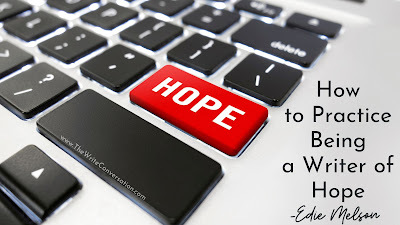
by Edie Melson @EdieMelson
Being a writer of hope is something I’m making a deliberate effort to become. Right now our world needs hope. There is so much in our world these days that can lead to hopelessness if we let it.
Because our passion (and business) is words, we have the ability to affect how others interpret the world. I’m not suggesting that we slant our viewpoint to something untrue, but rather that we take an honest look at the hope around us no matter what situation we’re viewing.
This is What Being a Writer of Hope Means to Me:
Reminding others—and ourselves—that no matter what we’re facing, we can use it to make the world better or worse.Reporting truth, but not forgetting that even the most difficult truth carries within it the seed of possibility.Remembering to be kind. We should always take time to make sure what we’re writing isn’t running others down.Remembering to be respectful. There are always two sides to every issue. Even when we disagree, we can do it without attacking one another.Repeating the fact that no situation is ever permanently bad. We all face struggles and stress, but nothing lasts forever.Redefining possibilities. Just as every situation has multiple possibilities, it’s our job as writers to bring those to light.Releasing the misconceptions we hold onto so tightly. We have to first take an honest look around us before we can share truth with others.Reinventing our own personal attitude. Unless we subscribe to the attitude of hope, it’s hard to encourage others.Reminding others of God’s ability to redeem anyone and any situation.
These are the precepts I’m trying to apply to every thing I write. What would you add to the list? Be sure to leave your thoughts in the the comments section below.
Don’t forget to join the conversation!Blessings,Edie
TWEETABLEHow to Practice Being a Writer of Hope from @EdieMelson (Click to Tweet)
 Edie Melson is a woman of faith with ink-stained fingers observing life through the lens of her camera. No matter whether she’s talking to writers, entrepreneurs, or readers, her first advice is always “Find your voice, live your story.” As an author, blogger, and speaker she’s encouraged and challenged audiences across the country and around the world. Her numerous books reflect her passion to help others develop the strength of their God-given gifts and apply them to their lives.Connect with her on her WEBSITE, through FACEBOOK, X (FORMALLY TWITTER) and on INSTAGRAM.
Edie Melson is a woman of faith with ink-stained fingers observing life through the lens of her camera. No matter whether she’s talking to writers, entrepreneurs, or readers, her first advice is always “Find your voice, live your story.” As an author, blogger, and speaker she’s encouraged and challenged audiences across the country and around the world. Her numerous books reflect her passion to help others develop the strength of their God-given gifts and apply them to their lives.Connect with her on her WEBSITE, through FACEBOOK, X (FORMALLY TWITTER) and on INSTAGRAM.
Published on November 05, 2024 22:00
November 4, 2024
Make the Story You Write Read Like A Film With First Person Cinematic POV
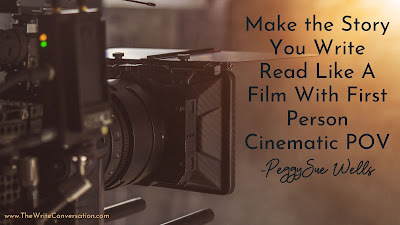
by PeggySue Wells @PeggySueWells
A writer’s most important job is to elicit emotion in the reader.
Beyond being the single issue most often fixed by editors, Point of View is possibly the most powerful tool used by a storyteller to evoke emotion in the reader.
First Person Cinematic is one of the nine forms of POV at a writer’s disposal. As the name implies, the Cinematic perspective narrates the story in manner that simulates the experience of a viewer watching a film. The author writes with the focus trained on the characters, reporting what they say and do.
A codicil is the Cinematic POV does not report on what a character thinks. The reader is left to imagine how a character thinks and feels based on their words and actions, a working example of show, don’t tell. Additionally, the reader imagines how they might feel in the same situation.
The Hunger Games novel is presented in First Person Cinematic. Readers see the story unfold in present tense through the eyes of Katniss Everdeen. The story opens with this first line.
"When I wake up, the other side of the bed is cold. My fingers stretch out, seeking Prim's warmth but finding only the rough canvas of the mattress. She must have had bad dreams and climbed in with our mother. Of course, she did. This is the day of the reaping."
Also written in First Person Cinematic areDivergent by Veronica Roth
There is one mirror in my house. It is behind a sliding panel in the hallway upstairs. Our faction allows me to stand in front of it on the second day of every third month, the day my mother cuts my hair.
The Knife of Never Letting Go from the Chaos Walking series by Patrick Ness The first thing you find out when yer dog learns to talk is that dogs don't got nothing much to say.
First Person POV is characterized by the words I, Me, My, Mine, We, and Us. First Person Cinematic POV usesFirst-person perspective. Readers see the story unfold through the eyes of the protagonist.Present tense narration. Readers feel the immediacy of the moment as the action happens.High-stakes. Readers are immersed in intense situations with the protagonist.
My favorite time to employ the Cinematic POV is during a flashback. The different tone separates the look-back from the rest of the narration of the story.
This is a scene from Chasing Sunrise in First Person Cinematic POV.
Instinctively, he reached to grab his fellow soldier and pull him back. The words were already forming in his mouth.
We can do this. Stay with me.
“Let him go.” Like a striking snake, his instructor knocked back Michael’s hand.
“You hear me, Mister? You let him go. Get your head back where it belongs. You’ve got a job to do. You got me?”
The fierce man stood between Michael and his retreating battle buddy. One glance at those determined eyes, and Michael knew this was a defining moment. He turned his attention forward once more.
When the best way to elicit emotion in the reader is to bring them beside the protagonist as the hero or heroine faces impossible odds, First Person Cinematic POV may be the tool for the story.
TWEETABLEMake the Story You Write Read Like A Film With First Person Cinematic POV @PeggySueWells on @EdieMelson (Click to Tweet)
 PeggySue Wells is the bestselling author of 40 books and collaborator of many more. Action and adventure, romantic suspense, military romance, and cozy mystery are the page-turning novels by P.S. Wells, including Homeless for the Holidays, Chasing Sunrise, The Patent, and Unnatural Cause. How to live better, easier, and simpler is the focus of her nonfiction including The Ten Best Decisions A Single Mom Can Make. Founder of SingleMomCircle.com, PeggySue coaches writing and speaks at events and conferences. When not writing, she parasails, skydives, snorkels, scuba dives, rides horses, and has taken (but not passed) pilot training. Connect with her at www.PeggySueWells.com, on Facebook at PeggySue Wells, and LinkedIn at linkedin.com/in/peggysuewells
PeggySue Wells is the bestselling author of 40 books and collaborator of many more. Action and adventure, romantic suspense, military romance, and cozy mystery are the page-turning novels by P.S. Wells, including Homeless for the Holidays, Chasing Sunrise, The Patent, and Unnatural Cause. How to live better, easier, and simpler is the focus of her nonfiction including The Ten Best Decisions A Single Mom Can Make. Founder of SingleMomCircle.com, PeggySue coaches writing and speaks at events and conferences. When not writing, she parasails, skydives, snorkels, scuba dives, rides horses, and has taken (but not passed) pilot training. Connect with her at www.PeggySueWells.com, on Facebook at PeggySue Wells, and LinkedIn at linkedin.com/in/peggysuewells
Published on November 04, 2024 22:00
November 3, 2024
3 Ways to Encourage a Writer

by Ginny Cruz, MPA, PT
Ernest Hemingway once said, "There is nothing to writing. All you do is sit down at a typewriter and bleed." In other words, you uncover and share those emotionally tender spots with strangers.
To impact readers and be effective, writers must be emotionally vulnerable. This vulnerability requires a bucket of courage and a sprinkle of craziness. That's why writers need kindhearted understanding and frequent loving encouragement to continue along their lonely path.
While some of us are naturally gifted encouragers, others need guidance.
3 to Encourage the Writers Around You
1. Train your eyes and ears to find positive aspects in their writing. While it's easy to take out that imaginary red pen and find everything you dislike, don't. Find what you love about it and tell the author. Writers often bleed onto the page many times before arriving at the final product. Please don't cut them even more with your hurtful comments.
2. Speak in love. When we appreciate their word-weaving gift, it becomes easier to lift their spirits. On the other hand, if we are jealous of their talent, our thoughts and words can become harmful. Writers evolve and improve with continued practice. First drafts are merely early editions of the final work. Be the friend who cheers the progress, not the one who smothers their creative fire.
3. Follow the Golden Rule. You can never go wrong treating others with the kindness you expect. Everyone loves to be loved and encouraged, so share uplifting words with your writer friends regardless of whether you receive them yourself. Positive praise acts as a healing balm to the soul.
Hebrews 3:13 (NIV) tells us to “. . . encourage one another daily, as long as it is called Today, so that none of you may be hardened by sins’s deceitfulness.” We sin when we fail to look for the good, forget to speak in love, or mistreat others. Jealousy, self-pity, and even misplaced anger are versions of pride. And pride blocks us from focusing on the needs of others.
Sitting down and pouring your heart onto a blank page is difficult for a writer. Questions swirl, such as, “Who will read it? or What difference will it make?” It means the world when a reader takes the time to appreciate the effort and share how much those words, written in silence to an audience of one, meant to them.
Therefore, as long as it is called Today, let us encourage the writers in our lives.
What are some ways others have encouraged you?
TWEETABLE3 Ways to Encourage a Writer from Ginny Cruz on @EdieMelson (Click to Tweet)
 Ginny Cruz, MPA, PT is a pediatric physical therapist, early intervention specialist, and award-winning author. Her writing encourages and teaches moms simple and effective ways to help their baby meet developmental milestones. In addition to writing, she enjoys hiking, reading, and camping with her husband. Find out more at ginnycruz.com, Instagram, or Facebook.
Ginny Cruz, MPA, PT is a pediatric physical therapist, early intervention specialist, and award-winning author. Her writing encourages and teaches moms simple and effective ways to help their baby meet developmental milestones. In addition to writing, she enjoys hiking, reading, and camping with her husband. Find out more at ginnycruz.com, Instagram, or Facebook.
Published on November 03, 2024 22:00
November 2, 2024
A Pattern on the Threshold for Writers, Part 2
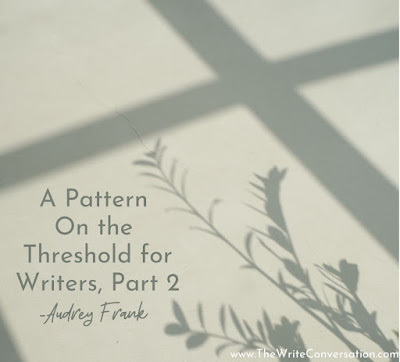
by Audrey Frank @AudreyCFrank
Go here to read last month’s Part One: A Pattern on the Threshold for Writers
Tempted in the Wilderness
Then Jesus was led by the Spirit into the wilderness to be tempted by the devil (Matthew 4:1).
There is an observable pattern in the lives of writers who stand on the threshold of God’s calling and purpose. Jesus asks us only to walk where He first has. On the eve of His public ministry, Jesus was compelled by the Spirit into the wilderness to be tempted.
In the place of wild animals and hunger, the resounding accusation of God’s enemy is if you are…
Following Jesus’ footsteps, we go into the wilderness equipped with the Father’s love and delight. Our identity is secure: We are Beloved and our Father delights in us.
God’s enemy hates that we are loved. Hates that we bring immeasurable joy to our Father. His temptation comes twisted, and deceptive.
Power
If you are the Son of God, tell these stones to become loaves of bread (Matthew 4:3).
It is easy to forget who transforms manuscripts into nourishing words that feed hearts and minds. We may be tempted to believe it is our power that transforms words into published books. We may trust the myth that platform size determines our success.
The victorious writer relies on God’s power to transform his words into books. The peace-filled writer knows that her most important platform is the fact that her identity in the Lord is Beloved, one who brings great joy to her Father. She is committed to giving her Father’s words to others.
But Jesus told him, No! The Scriptures say, ‘People do not live by bread alone, but by every word that comes from the mouth of God’ (v. 4).
The bread that nourishes human hearts is every word that comes from the mouth of God. When we allow God’s Word to feed our writing, we work together with Him to serve bread to hungry hearts.
Distortion
Then the devil took him to the holy city, Jerusalem, to the highest point of the Temple, and said, “If you are the Son of God, jump off! For the Scriptures say, ‘He will order his angels to protect you. And they will hold you up with their hands so you won’t even hurt your foot on a stone’” (vv.5-6)
Satan tempts us to distort the Word of God, believing that being His child means things will be easy. We’ll be protected from rejection, struggle, suffering. He tempts us to make demands of God in our zeal and impatience.
Jesus responded, “The Scriptures also say, ‘You must not test the Lord your God’” (v. 7).
Writers who spend regular time in Scripture can recognize the enemy’s distortions. They will be ready to respond to him with Truth. They know the writer’s way is not always safe, but they trust the One who is the Way.
Glory
Jesus’ third and final temptation happened on the peak of a very high mountain, where Satan showed him all the kingdoms of the world and their glory.
“I will give it all to you,” he said, “if you will kneel down and worship me” (v. 9).
This is perhaps the most tantalizing, deceptive temptation of all and this is where Jesus drew the line.
Get out of here, Satan,” Jesus told him. “For the Scriptures say, ‘You must worship the Lord your God and serve only him’” (v. 10).
Writers who follow Jesus’ example draw the line when the glitter and glam of publishing success tempts them to kneel to its mesmerizing power.
Control
Jesus was tempted to take control. He was, after all, the Son of God, with unlimited power. However, the Son of God chose to surrender to His Father’s control. He believed His Father who called Him Beloved, the One who delighted in Him. The Father who could be trusted.
Will we?
Lord, strengthen me with Truth that I may overcome temptation in the writer’s wilderness. Amen.
TWEETABLENOTE: Click to Tweet isn't working. But you can copy the text below and past it into the social media network of your choice!A Pattern on the threshold for Writers, part 2 from @AudreyCFrank on @EdieMelson https://bit.ly/3YNBaYJ #writing #writerslife (Click to Tweet)
 Audrey Frank is an author, speaker, and storyteller. The stories she shares are brave and true. They give voice to those whose words are silenced by shame, the hard things in life that don’t make sense, and the losses that leave us wondering if we will survive. Audrey and her family have spent over twenty years living and working among different cultures and world views, and she has found that God’s story of redemption spans every geography and culture. He is the God of Instead, giving honor instead of shame, gladness instead of mourning, hope instead of despair. Although she has three different degrees in communication and intercultural studies, Audrey’s greatest credential is that she is known and loved by the One who made her.
Audrey Frank is an author, speaker, and storyteller. The stories she shares are brave and true. They give voice to those whose words are silenced by shame, the hard things in life that don’t make sense, and the losses that leave us wondering if we will survive. Audrey and her family have spent over twenty years living and working among different cultures and world views, and she has found that God’s story of redemption spans every geography and culture. He is the God of Instead, giving honor instead of shame, gladness instead of mourning, hope instead of despair. Although she has three different degrees in communication and intercultural studies, Audrey’s greatest credential is that she is known and loved by the One who made her.Audrey is the author of Covered Glory: The Face of Honor and Shame in the Muslim World (Harvest House Publishers), an outpouring of Audrey’s heart to introduce others to the God of Instead. Shame is not unique to the developing world, the plight of the women behind veils, young girls trafficked across borders; shame is lurking in hearts everywhere. Through powerful stories from women around the world, Covered Glory illuminates the power of the Gospel to remove shame, giving honor instead. Available at favorite booksellers: BARNES & NOBLE, BOOKS A MILLION, AMAZON.
*All Scripture quotations are from the NLT.
Published on November 02, 2024 22:00
November 1, 2024
Pros and Cons for Writers Sharing a First Draft
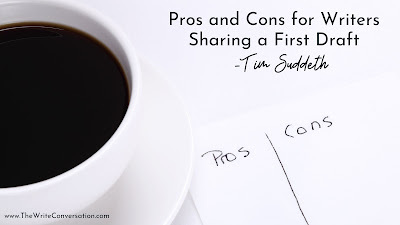
by Tim Suddeth @TimSuddeth
You finish that first chapter or article you’ve been working on for so long, searching for every right word, and creating dialog that will send the grumpiest curmudgeon into laughing hysterics. And your first instinct is to share it with the nearest victim—I mean, friend.
But should you?
This is NaNoWriMo and many of us will get with other writers for writing sprints, where you write for twenty minutes or so and then share your work. You feel so much anticipation as you nervously share your sparkling prose with your adoring listeners. (Please, hold your applause and remember the others.) Only to have it read and realize it sounds like a cacophony of cats. How did I write such drivel?
Do you run out the door and resolve that you will never write again? Do you change your writing so it’ll sound like everyone else? Or will you pick up your drivel, read it again while holding your nose, then say, “What if…” and start making corrections?
I’ve heard different views from writers and teachers about sharing your early work, some saying to wait until you have done a few drafts before letting anyone else look at it. Others think you should get opinions wherever and whenever you can. But like most things in writing, both sides can be true. You have to determine what works best for you.
Pros and Cons of Sharing the First Draft of What You've Written
ConsWhy you SHOULD NOT show your first chapters. (I know, I should start with the pros, but I want to end with the positives. And cons and pros sound funny.)
Con 1. Your reader doesn’t have your vision for the story.
When you start writing for the first time or start a different story, your voice, tone, or characters are just appearing. A reader can only tell you their opinion of what’s on the page, not what’s in your mind. You may want to write about Superman’s cat filling in for him while he has a sick day with a head cold. But one reader insists it should be a dog, because…really, a cat? Another reader says that this isn’t romantic suspense, you should label it a memoir. And another thinks you should take out the humor because they like Southern Gothic.
Protect your story.
Con 2. We don’t understand our story ourselves yet. And that’s okay.
For many of us, especially the pantsers (Can I get a whoop, whoop?), we aren’t sure what we are writing or who we are writing about. Much of our early writing is for discovery. We don’t know why Superman has a cat and not a dog. Or maybe he has a dog, but the pug is afraid to fly. We don’t know that yet. The cat/dog thing is still developing in our mind. But when our reader questions it, now we feel we must choose a side. And that could prevent us from getting to a surprising part of the story. (When the dog comes to the rescue.) Or it may hinder our original idea seed from fully blooming.
Con 3. Your readers’ praise affects your decisions.
Another problem we run into with showing our story early happens when they like something we’re experimenting with. The cat begins its day by rescuing a sloth that’s stuck in a tree. And our readers all think that is so original. Later, when that doesn’t work in our story, we remember how our readers raved about it, so we hesitate to make the correction. Murder your darlings, as they say. Just because it’s good writing doesn’t mean it works in this story.
ProsNow, let’s look at why we SHOULD share our early works with readers.
Pro 1. Our readers can give us encouragement.
Writing is hard. Have I said that before? Especially for a new writer who doesn’t yet feel like a member of the club. Yes, I got through grade school, but I’m still not sure my sentences make sense. And I can make friends laugh at the dinner table, but can I hold their attention on the page?
And does anyone really believe they have the audacity to write a book? That’s a lot of words. Isn’t that just for old, white guys with dinner jackets in New York City? When I discovered the little writing group that met at a church near me, I learned that writing for publication and for an audience is possible, even for a country boy or girl.
And with enough encouragement, there is no limit to where your writing can lead.
Pro 2. Our readers can give us direction.
Yes, I took my first samples of writing to Word Weavers. Yes, they didn’t throw it back at me or kick me out. And yes, it came back with a lot, I mean a lot, of red marks. We all have a steep learning curve for the craft of writing. And no matter how much you’ve written, there are still things that it takes someone else’s eyes to catch. The Bible talks about iron sharpening iron, in writing red ink sharpens plots.
And this isn’t important only for beginners but also as you continue to grow in your writing. Does your writing fit your genre? Will a magazine accept it? Or is it ready to be sent to an agent? It’s too easy to see what we think the story says and not what is on the paper. I recently got edits back for a manuscript I want to send out and I realize now my next few months are going to be busy making corrections and getting the wonderful ideas that are in my head on the paper.
Are you ready to share your writing? Are you ready to listen to others’ opinions while still holding onto the essence of your story? Have you found friends who will listen to your story without trying to make it theirs?
Writing is a solitary endeavor that is best done with others. Make sure you’re careful in whose advice you choose. Because when you find the right fit, it can make a world of difference.
What advice would you give to a new writer?
TWEETABLEPros and Cons for Writers Sharing a First Draft from @TimSuddeth on @EdieMelson (Click to Tweet)
 Tim Suddeth is a stay-at-home dad and butler for his wonderful, adult son with autism. He has written numerous blogs posts, short stories, and three novels waiting for publication. He is a frequent attendee at writers conferences, including the Blue Ridge Mountain Christian Writers Conference and a member of Word Weavers and ACFW. He lives near Greenville, SC where he shares a house with a bossy Shorky and three too-curious Persians. You can find him on Facebook and Twitter, as well as at www.timingreenville.com and www.openingamystery.com.
Tim Suddeth is a stay-at-home dad and butler for his wonderful, adult son with autism. He has written numerous blogs posts, short stories, and three novels waiting for publication. He is a frequent attendee at writers conferences, including the Blue Ridge Mountain Christian Writers Conference and a member of Word Weavers and ACFW. He lives near Greenville, SC where he shares a house with a bossy Shorky and three too-curious Persians. You can find him on Facebook and Twitter, as well as at www.timingreenville.com and www.openingamystery.com.
Published on November 01, 2024 22:00
October 31, 2024
Genre Expectations: Writing All the Punks

by A.C. Williams @ACW_Author
When I was a kid, punk culture had really taken hold of the world. However, the idea of punk culture started in music, with punk rock and the idea that great music didn’t need a record label to succeed. I guess you could say it was the anti-establishment movement of the mid 70s and early 80s.
But “punk” in books really only showed up as a genre since 1987, although since then a host of classics and other works have been retroactively labeled with the punk genre. And since 1987, the punk culture of books has exploded. Maybe you’ve only heard of steampunk or cyberpunk, which are arguably the largest segment of the punk genre. But there are countless others, so as we bring this series on genre expectations to a close, I figured it was time to take a brief look at all the punks.
But before we get started, here’s a quick review of what we’ve covered so far this year (all posts are linked at the end of this post): Romantic Fantasy and Fantasy RomanceFantasy and Space OperaSteampunk and GaslampMagical Realism and Contemporary FantasyUrban Fantasy and Paranormal RomanceSuspense and ThrillersDystopian and ApocalypticClassic Mystery and Cozy MysteryHorror and Gothic Horror
As we start looking at the punk genre, first let’s establish what punk is and where it came from. As the title suggests, the concept of punk novels came from punk rock bands—the anti-establishment creators of the 1970s who pushed back against a society that wanted to put them in boxes.
That is the essence of the punk genre of books. If you say you have a punk genre, that idea of anti-establishment thinking needs to be present in the story. True, punk genres are primarily aesthetic in that they are mostly named because of the elements of worldbuilding that go into creating the setting of the book, but to truly belong in the punk genre, the characters need to be struggling against something in the book’s culture or history. The characters must defy conventions in some way.
But once that base expectation is set, the sky is truly the limit. I’ve honestly lost track of the myriad different variations of punk writing. So we’ll pull out a few of the notable variations, and I’ll give you a few links to do more digging on your own.
Who knows? Maybe you’ve written a punk book, and you don’t even know it yet.
Steampunk (the most familiar)
Whenever we talk about the punk genres, Steampunk is usually the one that people mention first. These stories always take place in the Victorian Era (1837 to 1901) and feature technology based on steam power and cogs and gears. But true Steampunk rarely leaves the confines of England. It’s basically anachronistic stories about the British Empire in the 19th Century. You don’t have to struggle to find elements of anti-establishment behavior or defying conventions during this era of history. Frankly, the Victorians were all rebels in some way.
Common examples of this genre include Morgan L. Busse’s Soul Chronicles series and The League of Extraordinary Gentlemen comics. Classics like Jules Verne’s Twenty Thousand Leagues Under the Sea and The Time Machine are considered pre-cursors to steampunk.
Cyberpunk (the first punk genre)
Ironically, Cyberpunk as a genre pre-dated Steampunk. Steampunk came about in 1987, but Cyberpunk began in 1980. Cyberpunk stories are usually set in a nearish sort of future landscape, usually dystopian in some way. The aesthetic of these stories is usually dark and gritty, verging on industrial in some instances. But it can take place in any nation, any planet, anywhere. These stories usually focus on how the government or whoever is power has used technology to control the population.
Common examples of this genre include Blade Runner, The Matrix, and Ready Player One.
Dieselpunk
Dieselpunk is a little less well known than the first two variations, but as you might expect instead of the technology focusing on steam power or futuristic advancements, the primary focus is on diesel engines (along with advanced machines, robotics, and aviation). The era of these books usually begins at the start of World War I and stretches to the end of World War II. As with all punk genres, dieselpunk books need to have some element of defying conventions, but where steampunk often includes elements of hope and optimism, diselpunk is mostly negative in its outlook for the future.
Common examples of this genre include Sky Captain and the World of Tomorrow, The Company Man by Robert Jackson Bennett, and the Leviathan series by Scott Westerfield.
Clockpunk
Often confused with steampunk because of its reliance on gears and cogs in its aesthetic, the clockpunk genre is actually set at an earlier time period. It’s focused in the 18th Century rather than steampunk’s 19th century.
A great example of the clockpunk genre is actually an episode of Doctor Who, the science fiction television series from the U.K. The episode is called “The Girl in the Fireplace” and it features the Tenth Doctor (David Tennant) facing robotic villains that are made of clockwork technology.
Cattlepunk
Cattlepunk is a lot of fun, but it is often mistaken for steampunk because they take place during the same era of history. The difference is the setting, because while steampunk takes place in England, cattlepunk takes place in America. The Victoria Era in America was the wild west.
Examples of the cattlepunk genre include The Clockwork Century series by Cherie Priest (HIGHLY recommend) and The Dark Tower series by Stephen King.
With so many variations of the punk genre, you can absolutely find an aesthetic that matches your personal brand (I didn’t even touch biopunk, silkpunk, lacepunk, stonepunk, solarpunk, etc). But don’t take my word for it. Here are two online sources that have lots of information about all the different punk genres: Different punk: A to Z of punk genres All the Punks! An Introduction
Have so much fun getting your “punk” on!
TWEETABLEGenre Expectations: Writing All the Punks from author A.C. Williams (@ACW_Author) on @EdieMelson (Click to Tweet)
Don't Miss the Previous Posts in This Series 1. WRITING ROMANTIC FANTASY AND FANTASY ROMANCE
2. WRITING FANTASY AND SPACE OPERA
3. WRITING STEAMPUNK AND GASLAMP
4. WRITING MAGICAL REALISM AND CONTEMPORARY FANTASY
5. WRITING URBAN FANTASY AND PARANORMAL ROMANCE
6. WRITING SUSPENSE AND THRILLERS
7. WRITING DYSTOPIAN AND APOCALYPTIC
8. WRITING CLASSIC MYSTERY AND COZY MYSTERY
9. WRITING GOTHIC HORROR AND STANDARD HORROR
10. WRITING ALL THE PUNKS
 A.C. Williams, also known as Amy C. Williams, is a coffee-drinking, sushi-eating, story-telling nerd who loves cats, country living, and all things Japanese. Author of more than 20 books, she keeps her fiction readers laughing with wildly imaginative adventures about samurai superheroes, clumsy church secretaries, and goofy malfunctioning androids; her non-fiction readers just laugh at her and the hysterical life experiences she’s survived. If that’s your cup of tea (or coffee), join the fun at www.amycwilliams.com.
A.C. Williams, also known as Amy C. Williams, is a coffee-drinking, sushi-eating, story-telling nerd who loves cats, country living, and all things Japanese. Author of more than 20 books, she keeps her fiction readers laughing with wildly imaginative adventures about samurai superheroes, clumsy church secretaries, and goofy malfunctioning androids; her non-fiction readers just laugh at her and the hysterical life experiences she’s survived. If that’s your cup of tea (or coffee), join the fun at www.amycwilliams.com.
Published on October 31, 2024 22:00
October 30, 2024
Face Your Worst Writing Fears with These 10 Tips
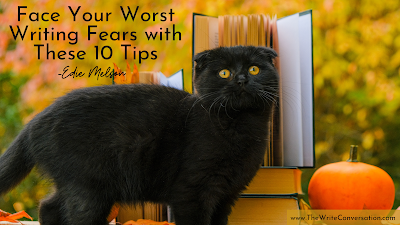
by Edie Melson @EdieMelson
Fall is upon us and with it come black cats and trick or treaters. Some cute and some . . . well . . . not so much. In this season of black and orange, I thought I'd highlight some fears all writers face and how to overcome them.
At a recent writing conference, I was talking to a friend of mine and this person confided she was afraid she just didn’t have what it took to be a writer.
“I’m just not good enough to get a book published, and I don’t know if I ever will be.”
“Welcome to the club,” I told her.
My answer wasn’t what she expected. She had forgotten something we had heard together at a conference many years ago. We’d been listening to an established author talk about his own fear and inadequacies. He told the audience that every time he sits down to write a new book, the fears resurface and he’s certain he no longer has what it takes to make it in publishing.
Hearing him confess his own fears gave me hope. Beyond that, it brought home an important fact. Being published—no matter if it’s a single book or a hundred—won’t necessarily make the fear disappear.
So what’s a writer to do?
10 Things for a Writer to do to Combat Fear
1. Pray First. Yep, EVERY SINGLE TIME. I've learned—the hard way—that before my fingers hit the keyboard, I pray. I don't care if I'm writing a blog post, working on a book, or scheduling social media. God has a purpose for every single keystroke. And I for one, want to make sure I'm focused on His purpose instead of mine.
2. Write Regularly. For some of us that means daily. For others it means on the weekend, or three days a week. The truth is, mood is a fickle mistress and time is NEVER lying around waiting to be found!
3. Choose to Ignore the Negative Voices in Your Head. We all have them—those irritating whispers that tell us we’re not good enough, and we’re selfish to even try to follow our dreams. We can write anyway, or we can cave in to our insecurities. Published writers keep writing, no matter what those voices say.
4. Write Outside Your Comfort Zone. The publishing industry is in a constant state of change. What you write today, may not be popular five years from now. As a writer, you’ll have to constantly be changing and growing. Get used to it now and avoid the deer-in-the-headlights reaction when change comes your way.
5. Find a Writing Community. This is a tough enough business without trying to fly solo. We all need fellow writers who understand what we’re doing. These fellow travelers will keep us accountable and encourage us when we think we can’t go any further.
6. Write When You Don’t Have the Time. So often I hear people who want to be published talk about how they’ll start when they find the time. The truth is that time is NEVER lying around waiting to be found. Following our dreams takes sacrifice. We must be willing to make the hard choices and carve out time to write.
7. Stay Active in the Industry. Join writing groups—locally and online. Give back to the writing community at large by volunteering to help others. Trust me when I tell you that no matter where you are in your writing journey, there are those less experienced. And by staying active, it’s harder to quit. The times I’ve wanted to throw in the towel it was having to answer to others that kept me going.
8. Write When You’re NOT Inspired. We cannot wait for the mood strike to write. Inspiration is a fickle mistress. If we’re serious about pursuing publishing dreams, we must move beyond depending on our mood to be able to write.
9. Remind Yourself Why You Write. For me, written words are the way I process life. I don’t talk things out, I write things out. God designed me to be like this. Writing is His gift to me. I have those words taped above my desk so I’ll never forget.
10. Write Through the Fear. Being a published writer goes hand in hand with fear. We’re afraid we won’t be good enough to be published, then that no one will read the book, and finally that we won’t be able to write another book.
These are my tips to help me face my writing fears. What would you add to the list? Be sure to share your thoughts in the comments section below.
Don’t forget to join the conversation!Blessings,Edie
TWEETABLEFace Your Worst Writing Fears with These 10 Tips from @EdieMelson (Click to Tweet)
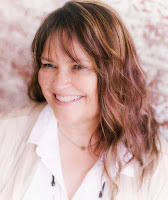 Edie Melson is a woman of faith with ink-stained fingers observing life through the lens of her camera. No matter whether she’s talking to writers, entrepreneurs, or readers, her first advice is always “Find your voice, live your story.” As an author, blogger, and speaker she’s encouraged and challenged audiences across the country and around the world. Her numerous books reflect her passion to help others develop the strength of their God-given gifts and apply them to their lives.Connect with her on her WEBSITE, through FACEBOOK, X (FORMALLY TWITTER) and on INSTAGRAM.
Edie Melson is a woman of faith with ink-stained fingers observing life through the lens of her camera. No matter whether she’s talking to writers, entrepreneurs, or readers, her first advice is always “Find your voice, live your story.” As an author, blogger, and speaker she’s encouraged and challenged audiences across the country and around the world. Her numerous books reflect her passion to help others develop the strength of their God-given gifts and apply them to their lives.Connect with her on her WEBSITE, through FACEBOOK, X (FORMALLY TWITTER) and on INSTAGRAM.
Published on October 30, 2024 22:00
October 29, 2024
How Writers Can Stay Out of the Haunted House of What-If
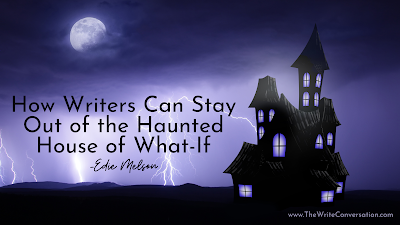
by Edie Melson @EdieMelson
If then you have been raised with Christ, seek the things that are above, where Christ is, seated at the right hand of God. Set your minds on things that are above, not on things that are on earth. (Colossians 3:1-2 ESV)
I’m a big one to visit the world of what-if—especially when it comes to many aspects of writing. I do it when I’m writing, when I’m submitting, and especially when I’m marketing.
And I’ve discovered that what-if is a land of make-believe—as much of a haunted house as any we visit during this Halloween season.
It’s a world populated with all the scary—negative—things I can think up. My writing stinksI’m not a real writerNo one will want to read thisNo one will publish thisIf it is published, no one will leave a reviewIf they do leave a review, it will be negativeMy social media posts are worthlessMy marketing sounds like a traveling salesman
Truthfully, I could go on and on and on. My imagination is expert at coming up with negative things—often aided and abetted by the enemy who whispers lies into my soul.
I’m far too familiar with this haunted house of what-if. I’ve visited there many times during my life. I know the rooms of haunted corners, shadowy trapdoors, and mazes of punishing practices. I recognize them for their futility. Even with that recognition, if I’m not purposeful, what-if is still the first place I go when the writing life gets stressful.
I am spending less time there now because I’m quicker to recognize the dreary blueprint and leave. But it’s taken years to understand the path around (and out of) that haunted house is a journey of faith.
7 Ways a Writer Can Stay Out of the What-If Haunted House:
1. First, and foundationally, I pray. My prayer asks God to separate lies from truth. I don’t want only flattery, but I want truth that leads my writing to glorify God. If I dwell only on the negative, I can end up quitting instead of letting God use me for His work.
2. Stop and take a deep breath. Notice where you are headed. Acknowledge the overwhelming urge to worry and fret and explore the haunted landscape of what if. By looking full on where we are going, we can make a deliberate decision to turn around.
3. I’ve learned to keep lists of the good things people have said about my writing and me as a writer. When the doubts intrude and my mind wanders toward this haunted destination, I pull out those lists and rehearse the positive.
4. I also go to Scripture. There are a lot of verses that can encourage us as writers. Here are two blog posts to help you find those that speak to you: Bible Verses and Prayers for Writers Pray Over Your Writing with These 21 Bible Verses
5. Call a writing friend. Changing from a worrier into a warrior needs the help of others. Find someone who will hold you accountable. Someone well-versed in Scripture and not prone to join you in the haunted land.
6. Choose to dwell in the land of certainty. The bible tells us that we’re already citizens of heaven. Ephesians 2:6-7 gives us that: And God raised us up with Christ and seated us with him in the heavenly realms in Christ Jesus, 7 in order that in the coming ages he might show the incomparable riches of his grace, expressed in his kindness to us in Christ Jesus.
7. Keep writing. I’ve found when I keep writing, it’s easier to stay out of the what if trap. I’ve also discovered that staying in God’s will (writing) derails the enemy and makes me stronger. If we can get sucked into the haunted what-if house, we become ineffective.
There are a lot of battles writers face. And many of them have to do with faith—faith God has truly called us and faith God can really use us in His work are two of the big ones. Both of these are fixtures in the Haunted house of what-if. But it’s our job to trust God and His purpose and stay out of the scary places our mind wants to visit.
A Prayer Asking for God to Deliver Me From What If
Yet God has made everything beautiful for its own time. He has planted eternity in the human heart, but even so, people cannot see the whole scope of God’s work from beginning to end. (Ecclesiastes 3:11 NLT)
Dear Lord, You are sovereign and You know the end from the beginning. Yet I act as if I don’t believe this foundational truth. I’m once again mired in the bog of what-if, and it’s sucking me under. Help me focus on You and leave this dreary place.
I’m such a control freak, and yet, I’m finding no comfort in the false belief that I can control the world around me. I wanted this writing thing to be easy and only filled with joy. I wanted the path I expected.
Since I can’t have my way, I want to understand my struggle. Chasing that answer has led me into the haunted house of what if. Everywhere I turn, I’m bombarded by the lies that say I’m not enough and never will be. Help me, Lord, to silence the voices. Show me the truth and where I need to grow. Most of all, fill me with the peace of knowing Your plan is still unfolding and You have plans far beyond what I can hope or imagine. Keep me from the nightmares of what if and cover me with your wings of love. Amen.
Now it's your turn. How do you avoid the haunted house of what-if? Share your thoughts in the comments section below.
Don't forget to join the conversation!Blessings,Edie
TWEETABLEHow Writers Can Stay Out of the Haunted House of What-If from @EdieMelson (Click to Tweet)
 Edie Melson is a woman of faith with ink-stained fingers observing life through the lens of her camera. No matter whether she’s talking to writers, entrepreneurs, or readers, her first advice is always “Find your voice, live your story.” As an author, blogger, and speaker she’s encouraged and challenged audiences across the country and around the world. Her numerous books reflect her passion to help others develop the strength of their God-given gifts and apply them to their lives.Connect with her on her WEBSITE, through FACEBOOK, X (FORMALLY TWITTER) and on INSTAGRAM.
Edie Melson is a woman of faith with ink-stained fingers observing life through the lens of her camera. No matter whether she’s talking to writers, entrepreneurs, or readers, her first advice is always “Find your voice, live your story.” As an author, blogger, and speaker she’s encouraged and challenged audiences across the country and around the world. Her numerous books reflect her passion to help others develop the strength of their God-given gifts and apply them to their lives.Connect with her on her WEBSITE, through FACEBOOK, X (FORMALLY TWITTER) and on INSTAGRAM.
Published on October 29, 2024 22:00



